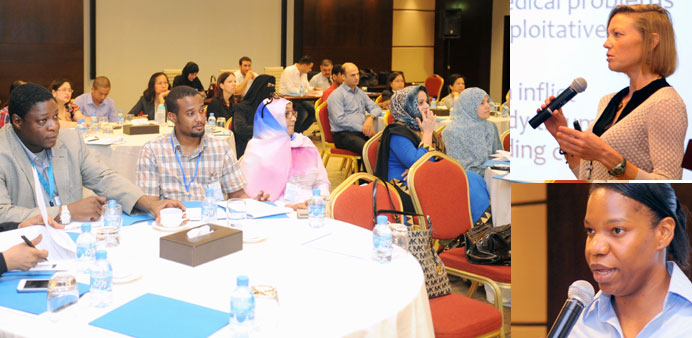By Joey Aguilar
The Qatar Foundation for Social Protection and Rehabilitation (QFSPR) held a workshop yesterday to better equip doctors, nurses and social workers in identifying victims of human trafficking.
“It is equipping the health professionals on what to do when they have cases in their clinic: who to call, how to deal with it, what are the policies, what are the referral mechanisms,” said Dr Katherine Welch, director of Relentless – a non-profit organisation based in Thailand working to serve the health needs of abused, exploited, and trafficked people in various parts of the world.
She told Gulf Times that the workshop was organised to engage participants in learning more about human trafficking and the physical and mental health consequences of chronically traumatised people.
Welch believes that a multidisciplinary approach should be applied to effectively stop a problem experienced not only in Qatar but in other countries as well.
She said tapping health professionals in the fight against slavery is one effective strategy since victims usually come to clinics or hospitals to see a doctor to seek help.
Part of the workshop was getting some recommendations on how to establish a proper referral mechanism especially when faced with a case.
During each session, various topics were tackled such as the “Do’s” and “Don’ts” in handling a certain case; clues a person might have been trafficked; and protocols, networking and referral, among others.
QFSPR has established a hotline (108) where doctors, nurses and social workers can call if they suspect that a patient is a possible victim of human trafficking. The organisation believes that they can serve as strong advocates for survivors while promoting sound strategies for prevention.
Some of the “Don’ts” included: Do not rescue a patient yourself and do not disclose your personal address or attempt to shelter a patient in your home.
Some of the “Do’s” included Do ensure safety of the patient, yourself and the health facility first and find ways to talk to the patient alone. Doctors and nurses are also advised to report a case to a social worker (in the hospital or clinic) who then communicates with the case managers.
However, some participants also raised some issues such as keeping the identity and assuring the safety of the informant.
“Everyone does not want to put his or her job on the line,” said one participant.
One social worker suggested that QFSPR should work closely with government agencies and other concerned authorities to stabilise a proper referral mechanism or define a proper reporting system.
She said some hospitals may have memos and systems on how to handle cases without putting the informant at risk but this may not be present in most private health providers.
Monique Gershon, project officer at QFSPR, told participants that they keep all information and contact details of informants confidential.
She said that they have already signed a memorandum of understanding with the police and the immigration in handling reported human trafficking cases.
Asked about the issue of human trafficking in Qatar, Welch noted that the problem is large but efforts are gaining momentum to address the issue. She lauded Qatar Foundation for doing a great job.

